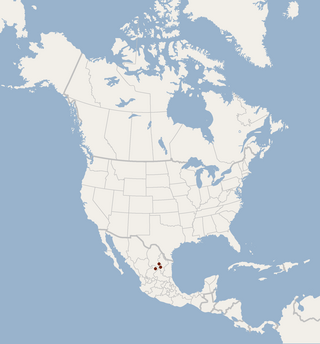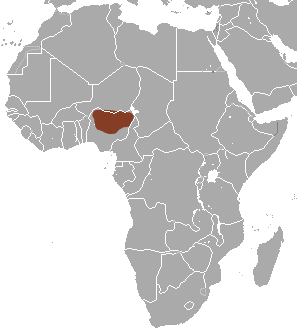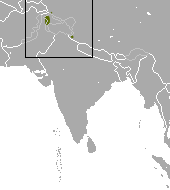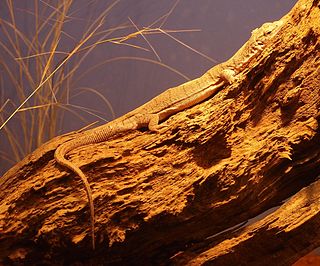
The flat-headed cat is a small wild cat with short reddish-brown fur. Its head is elongated, and its ears are rounded. Its slender body is 41 to 50 cm long with a tail of 13 to 15 cm, and it weighs 1.5 to 2.5 kg.

Gekkonidae is the largest family of geckos, containing over 950 described species in 62 genera. The Gekkonidae contain many of the most widespread gecko species, including house geckos (Hemidactylus), the tokay gecko (Gekko), day geckos (Phelsuma), the mourning gecko (Lepidodactylus), and dtellas (Gehyra). Gekkonid geckos occur globally and are particularly diverse in tropical areas. Many species of these geckos exhibit an adhering ability to surfaces through Van der Waals forces utilizing intermolecular forces between molecules of their setae and molecules of the surface they are on.

Heteronotia is a genus of geckos, lizards in the family Gekkonidae. The genus is endemic to Australia. Species in the genus Heteronotia are commonly known as prickly geckos.

Gekkoninae is a diverse subfamily of the family Gekkonidae, geckos. It has the most species and genera — over 850 species in 30 genera. Hemidactylus and Cyrtodactylus together account for 185 species.

Tarentola mauritanica, known as the common wall gecko, is a species of gecko (Gekkota) native to the western Mediterranean area of North Africa and Europe. It has been introduced to Madeira and Balearic Islands, and the Americas. A nocturnal animal with a predominantly insectivorous diet, it is commonly observed on walls in urban environments in warm coastal areas; it can be found further inland, especially in Spain where it has a tradition of cohabitation with humans as an insect hunter. A robust species, up to 15 centimetres (5.9 in) long, its tubercules are enlarged and give the species a spiny armoured appearance.

Ozimops planiceps is a small bat in the family Molossidae, native to Australia and Indonesia.

The firewood catfish a species of South American pimelodid catfish, is the sole member of the genus Sorubimichthys. Known by locals along the Amazon Basin as peixe-lenha, the firewood catfish is so called because it is of little eating value and is often dried and used for firewood.

The flat-headed myotis is a species of vesper bat. It is endemic to Mexico where it is found in certain montane forests in the Sierra Madre Oriental in the northeast of the country. Once thought to be extinct, this bat was rediscovered in 2004 by Joaquín Arroyo-Cabrales and colleagues. The species is now classified as endangered by the IUCN.

The flat-headed shrew is a species of mammal in the family Soricidae. It is found in the Democratic Republic of the Congo, Ethiopia, Nigeria, and Uganda. The flat-headed shrew is listed as Data Deficient on the IUCN Red List of Threatened Species.

The Kashmir pygmy shrew is a species of mammal in the family Soricidae. It is found in India and Pakistan.

Heteronotia binoei, known commonly as Bynoe's gecko, is a species of lizard in the family Gekkonidae, and is endemic to Australia. One of the continent's least-habitat-specific geckos, it occurs naturally across much of the country, and has also established in areas where it does not occur normally, such as urban Perth, Western Australia. It is dark brown to reddish-brown, depending on the colour of the ground upon which it lives, as well as irregular light bands with dark edges along its back.

The pygmy mulga monitor, also known commonly as Gillen's monitor or just the mulga monitor, is a species of lizard in the family Varanidae. The species is endemic to Australia.

Anolis planiceps, commonly known as the golden-scaled anole, orange-fanned leaf-litter anole, or goldenscale anole, is a species of lizard in the family Dactyloidae. The species is found in Venezuela, Guyana, Brazil, and Trinidad.
Ozimops petersi, the inland free-tailed bat is a species of bat found in Australia.
Ozimops kitcheneri, the south-western free-tailed bat, is a species of molossid bat found in Southwest Australia. A small flying mammal, it forages in forests and woodlands for insects.

The black Pilbara gecko is a species of gecko. It is endemic to Australia.

Heteronotia spelea, also known as Pilbara cave gecko, cave prickly gecko, or desert cave gecko, is a species of gecko. It is endemic to Australia.
The flathead sea catfish is a species of catfish in the family Ariidae. It was described by Franz Steindachner in 1876, originally under the genus Arius. It inhabits rivers, estuaries, and marine waters on the Pacific coast, from Mexico to Panama, at a maximum depth of 60 m (200 ft). It reaches a maximum total length of 60 cm (24 in). It is currently ranked by the IUCN redlist as being of Least Concern, due to a lack of known major threats for the species.
The flat-headed salamander is a species of salamander in the family Plethodontidae. It is endemic to the United States, where it is known from Virginia and likely North Carolina.
The Volcan de Toluca pocket gopher, also known as the flathead pocket gopher, Volcán de Toluca pocket gopher, Nevado de Toluca pocket gopher, or the Toluca Volcano pocket gopher, is a species of pocket gopher that is native to south-central Mexico, at upward elevations of 2500–3500 m. It was described by Clinton Hart Merriam in 1895.















